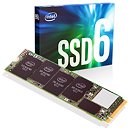- Joined
- Oct 9, 2007
- Messages
- 47,860 (7.38/day)
- Location
- Dublin, Ireland
| System Name | RBMK-1000 |
|---|---|
| Processor | AMD Ryzen 7 5700G |
| Motherboard | Gigabyte B550 AORUS Elite V2 |
| Cooling | DeepCool Gammax L240 V2 |
| Memory | 2x 16GB DDR4-3200 |
| Video Card(s) | Galax RTX 4070 Ti EX |
| Storage | Samsung 990 1TB |
| Display(s) | BenQ 1440p 60 Hz 27-inch |
| Case | Corsair Carbide 100R |
| Audio Device(s) | ASUS SupremeFX S1220A |
| Power Supply | Cooler Master MWE Gold 650W |
| Mouse | ASUS ROG Strix Impact |
| Keyboard | Gamdias Hermes E2 |
| Software | Windows 11 Pro |
IMFlash Technologies (IMFT), the Intel-Micron joint venture that manufactures NAND flash and 3D Xpoint memory for use in Intel and Micron end-user products, and Micron Technology-branded NAND flash supply to other SSD manufacturers, is facing a big hurdle with its QLC NAND flash manufacturing ramp-up, which if not checked, could influence SSD prices globally. The company is apparently seeing dangerously low yields of less than 50 percent for its 3D QLC NAND flash memory. This effectively makes its QLC NAND pricier (in terms of $/GB) than current-generation 3D TLC NAND.
The first victim of low yields of 3D QLC NAND flash is Intel's SSD 660p series, a mainstream NVMe SSD that brought 1 TB of storage under the $200-mark. Sources within IMFT tell Tweaktown that the company is seeing 48% yields in its 64-layer QLC NAND flash wafers (i.e. 52% of the wafer is unfit for further production). In contrast, 64-layer 3D TLC yields are above 90% (margin/incomplete dies are excluded from these figures). What's worse, the source predicts that the conditions may never get better with this generation.

View at TechPowerUp Main Site
The first victim of low yields of 3D QLC NAND flash is Intel's SSD 660p series, a mainstream NVMe SSD that brought 1 TB of storage under the $200-mark. Sources within IMFT tell Tweaktown that the company is seeing 48% yields in its 64-layer QLC NAND flash wafers (i.e. 52% of the wafer is unfit for further production). In contrast, 64-layer 3D TLC yields are above 90% (margin/incomplete dies are excluded from these figures). What's worse, the source predicts that the conditions may never get better with this generation.

View at TechPowerUp Main Site





